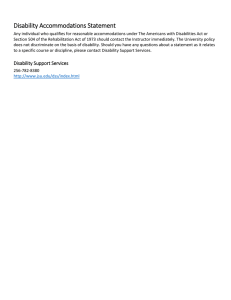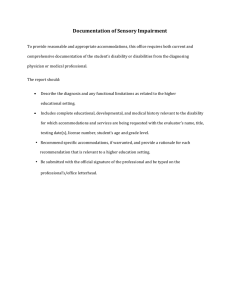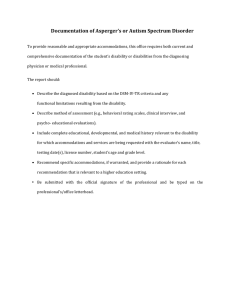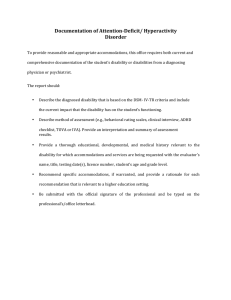Learning Disability
advertisement
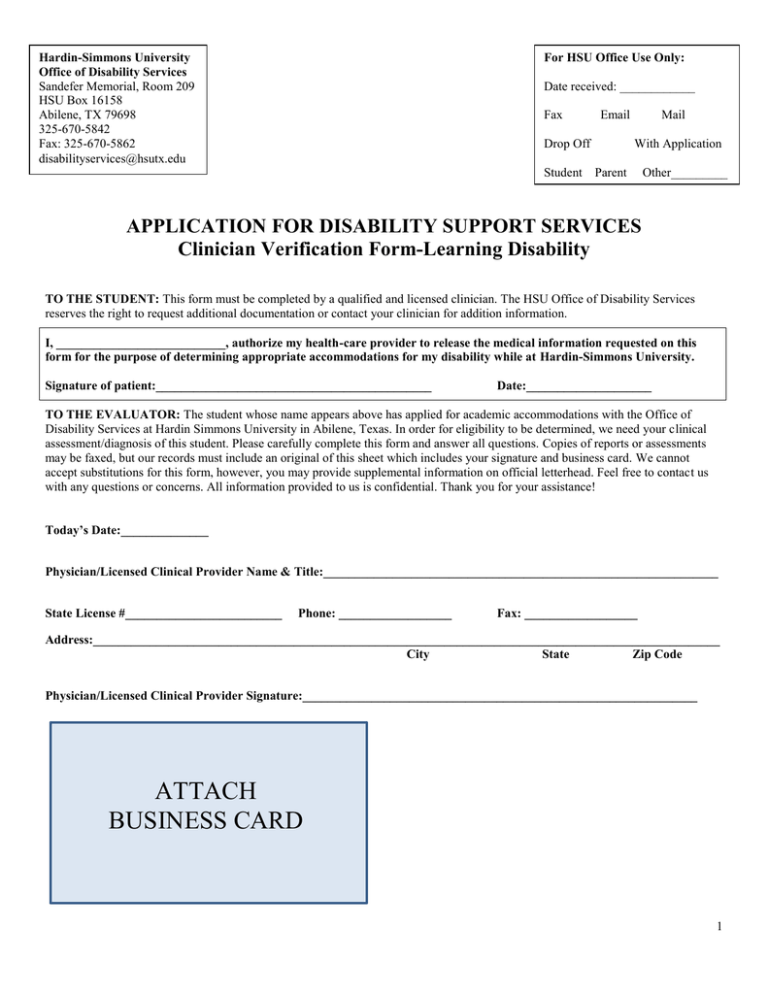
Hardin-Simmons University Office of Disability Services Sandefer Memorial, Room 209 HSU Box 16158 Abilene, TX 79698 325-670-5842 Fax: 325-670-5862 disabilityservices@hsutx.edu For HSU Office Use Only: Date received: ____________ Fax Email Drop Off Student Mail With Application Parent Other_________ APPLICATION FOR DISABILITY SUPPORT SERVICES Clinician Verification Form-Learning Disability TO THE STUDENT: This form must be completed by a qualified and licensed clinician. The HSU Office of Disability Services reserves the right to request additional documentation or contact your clinician for addition information. I, ___________________________, authorize my health-care provider to release the medical information requested on this form for the purpose of determining appropriate accommodations for my disability while at Hardin-Simmons University. Signature of patient:____________________________________________ Date:____________________ TO THE EVALUATOR: The student whose name appears above has applied for academic accommodations with the Office of Disability Services at Hardin Simmons University in Abilene, Texas. In order for eligibility to be determined, we need your clinical assessment/diagnosis of this student. Please carefully complete this form and answer all questions. Copies of reports or assessments may be faxed, but our records must include an original of this sheet which includes your signature and business card. We cannot accept substitutions for this form, however, you may provide supplemental information on official letterhead. Feel free to contact us with any questions or concerns. All information provided to us is confidential. Thank you for your assistance! Today’s Date:______________ Physician/Licensed Clinical Provider Name & Title:_______________________________________________________________ State License #_________________________ Phone: __________________ Fax: __________________ Address:____________________________________________________________________________________________________ City State Zip Code Physician/Licensed Clinical Provider Signature:_______________________________________________________________ ATTACH BUSINESS CARD 1 The HSU Office of Disability Services provides academic accommodations to students with disabilities that reflect a current substantial limitation to a major life activity as it relates to higher education. To insure the provision of reasonable and appropriate accommodations for our students, this office requires current and comprehensive documentation of the disorder from a current treatment/assessment professional who is legally qualified to make the diagnosis. The diagnosis of a learning disability should be evidenced by a psychological/educational evaluation performed by a qualified and licensed professional such as a clinical or educational psychologist, school psychologist, neuropsychologist, medical doctor, educational diagnostician, or other qualified professional. The provision of reasonable accommodations is based upon assessment of the current impact of the disability on a student’s academic functioning, evaluations must have been performed either within the last 3 calendar years or during adulthood (after 18 years of age). Documentation of Learning Disabilities should include: A. Comprehensive testing which addresses the following domains: APTITUDE: A complete intellectual assessment with all subtests and standard scores reported. The Weschler Adult Intelligence Scale - III (WAIS-III) or the WIAS-IV is the highly preferred instrument. The Woodcock-Johnson Psycho-Educational Battery III: Tests of Cognitive Ability, the Kaufman Adolescent and Adult Intelligence test, and the Stanford-Binet Intelligence Scale (4th ed.) are also acceptable. ACHIEVEMENT: A comprehensive academic achievement battery is essential with all subtests and standard scores reported for those subtests administered. Preferred instruments include the Woodcock-Johnson Psycho educational Battery III: Tests of Achievement; Weschler Individual Achievement Test-II (WIAT-II); Stanford Test of Academic Skills; Scholastic Abilities for Adults (SATA); or specific achievement tests such as the Test of Written Language (TOWL-3), Woodcock Reading Mastery Test -Revised, or the Stanford Diagnostic Mathematics Test. Standard scores must be reported and interpreted. INFORMATION PROCESSING: Specific areas of information processing (i.e. short and long term memory, sequential memory, auditory and visual perception processing, processing speed, executive functioning an motor ability) should be addressed. Preferred instruments include the Detroit Tests of Learning Aptitude (DTLA-3), the Detroit tests of Learning Aptitude - Adult (DTLA-A), information from subtests on WAIS-III or WAIS-IV, and the Woodcock-Johnson Psycho-Educational Battery -Revised: Tests of Cognitive Ability. Standard scores and/or percentiles should be provided and interpreted for all normed measures. Grade equivalents are not useful unless standard scores and/or percentiles are also included. B. The thorough completion of the following questions: DSM IV Diagnosis________________________________________________________________________ (The terms “learning styles”, “learning differences”, “academic problems”, and “test difficulty/anxiety”, in and of themselves do not constitute a learning disability. Please use direct language in filling out this form and avoid such terms as “suggests” or “is indicative of”.) Date of Diagnosis_________ Date of Last Contact with Patient_________ Please check the tests that were used to assess each of the following areas: Aptitude: ____ WAIS-IV or WAIS III (Highly Preferred) ____ Woodcock-Johnson Psycho-Educational Battery-Revised: Test of Cognitive Ability ____ Kaufman Adolescent and Adult Intelligence Test ____ Stanford-Binet Intelligence Scale (4th ed.) * NOTE: Kaufman-Brief Intelligence Test (K-BIT), TONI, & Shipley Institute of Living Scale are NOT accepted by this office as adequate measures of intelligence/aptitude. 2 Achievement: ____Woodcock-Johnson Psychoeducational Battery III: Tests of Achievement ____ Weschler Individual Achievement Test (WIAT) ____ Stanford Test of Academic Skills ____ Scholastic Abilities for Adults (SATA) * NOTE: The WRAT is NOT accepted by this office as adequate measures of achievement. Specific Achievement (If applicable): ____ Test of Written Language (TOWL-3) ____ Woodcock Reading Mastery Test-Revised ____ Stanford Diagnostic Mathematics Test Information Processing (If applicable): Specific areas of information processing (i.e. short and long term memory, sequential memory, auditory and visual perception processing, processing speed, executive functioning and motor ability) should be addressed. ____ Detroit Tests of Learning Aptitude (DTLA-3) ____ Detroit Tests of Learning Aptitude-Adult (DTLA-A) ____ Appropriate subtests on the WAIS-R or WAIS III ____ Appropriate subtests on the WJPB III: Tests of Cognitive Ability All subtest scores must be reported; all standard scores and percentiles must also be reported and interpreted on your written evaluation. Grade equivalents are not useful unless standard scores and percentiles are also included. Please indicate the nature and severity of the learning disability. Please explain how patterns in the student’s cognitive ability, achievement and information processing reflect the presence of a learning disability. 3 Please indicate the current substantial limitation to learning or other major life activity presented by the learning disability and the degree to which it impacts the individual in the learning context for which reasonable accommodations are being requested. * NOTE: a converted standard score of any subtest must be at least one standard deviation (15 points) below the full scale IQ score to constitute a substantial limitation. However, a 15 point discrepancy alone is not adequate information to determine a learning disability diagnosis. Please provide evidence of ruling out any alternative explanations for academic problems such as a result of poor education, poor motivation and/or study skills, emotional, mental, or physical problems, attention problems, and/or cultural/ language differences. Please include any criteria in the DSM-IV that require you to rule out other disorders/problems. (Example: 315.32 Mixed Receptive-Expressive Language Disorder, Criteria C. requires you to make sure that criteria for pervasive developmental disorder are not met.) Please provide an individualized, detailed history of the student’s educational, medical, psychosocial, and family histories that relate to the learning disability. 4 Please provide your recommendations for reasonable academic accommodations to equalize this student’s opportunities at a post-secondary level. Include your rationale for arriving at these recommendations and how they would be helpful in equalizing the student’s opportunities. Please include any record of student’s prior accommodation or auxiliary aides, including information about specific conditions under which the accommodations were used (e.g. standardized testing, final exams, licensing/certification exams) and discuss how accommodations were helpful or not helpful. * NOTE: under Section 504 and ADA, the notion that a student “would benefit from” a certain accommodation is not a sufficient rationale for providing accommodations. The intent of the law is to equalize educational opportunities, not to “guarantee success” in postsecondary education. Please describe any relevant information you may have, that has not been addressed, regarding this student’s potential for success at Hardin-Simmons University. Return this form and any attachments to: Hardin-Simmons University Office of Disability Services HSU Box 16158 Abilene, TX 79698 325-670-5842 Fax: 325-670-5862 5




